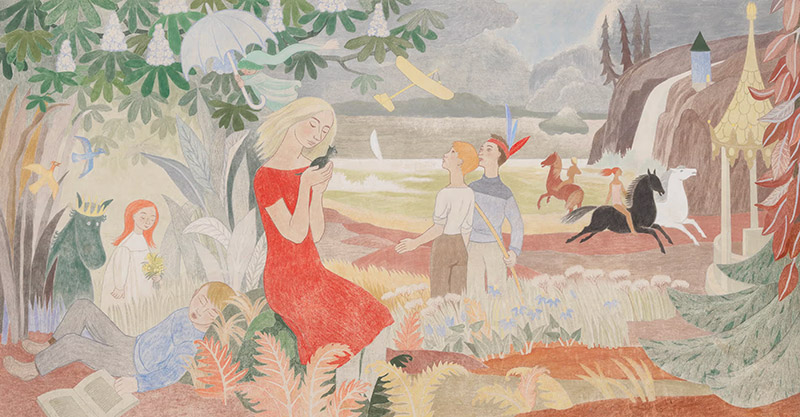Linked List: October 2024
Tuesday, 29 October 2024
- Imgtlk Garbatella 2024 ✶
-
A somewhat random project powered by food, wine, and @erikvaningen.
Monday, 28 October 2024
- Paradise: Tove Jansson’s public paintings ✶
-
Exhibition of public artworks by Tove Jansson at the Helsinki Art Museum. I’m not familiar with her art, but loved The Summer Book.

Tove Jansson: Bird Blue, 1953 (detail). © Tove Jansson Estate. Photo: HAM / Maija Toivanen.
Tuesday, 15 October 2024
- The quiet art of observation ✶
-
Succinct description of one of the key insights in The First and Last Freedom.
Saturday, 12 October 2024
- There’s something wrong with suburbia ✶
-
Intro video from a channel called Not Just Bikes with “stories of great urban planning and urban experiences from the Netherlands and beyond.” Found StrongTowns.org via the channel, too.
Wednesday, 9 October 2024
- Rest of World ✶
-
Haven’t dug deep into it, but this seems an interesting find. A nonprofit publication about parts of the digital world outside the usual technology media coverage, showing underserved communities’ unique perspectives.
I like the dynamic logo with diacritics that change when you refresh the page.
Wednesday, 2 October 2024
- Hope produces space and time? ✶
-
That question is the last thing the physicist John Archibald Wheeler wrote in his journal, at 95 years old. Quite a question.
The longer I live, the more I appreciate Kurt Gödel’s proof that we can never know everything about the universe.
- Defeating Heisenberg ✶
-
Jesse Schell, writing in chapter 2 of The Art of Game Design: A Book of Lenses, that I borrowed from the local library and am thoroughly enjoying:
But there is still a greater challenge of introspection. How can we observe out own experiences without tainting them, since the act of observation itself is an experience? We face this problem quite often. Try to observe what your fingers are doing as you type at a computer keyboard and you will quickly find yourself typing slowly and making many errors, if you can still type at all. Try to observe yourself enjoying a movie or a game, and the enjoyment can quickly fade away. Some call this ‘paralysys by analysis,’ and others refer to it as the Heisenberg principle. This principle, in reference to the Heisenberg uncertainty principle from quantum mechanics, implies that the attributes of a particle cannot be observed without affecting those attributes. Similarly, the nature of an experience cannot be observed without affecting the nature of that experience. This makes introspection sound hopeless. While it is a challenging problem there are ways around it that are quite effective, though some take practice. Most of us are not in the habit of openly discussing the nature of our thought processes, so some of the following is going to sound a little strange.
…
All this talk of experience brings out an idea that is very strange indeed. The only reality that we can know is the reality of the experience. And we know that what we experience is ‘not really reality.’ We filter reality through our senses and through our minds, and the consciousness we actually experience is a kind of illusion — not really reality at all. But this illusion is all that can ever be real for us, because it is us. This is a headache for philosophers, but a wonderful thing for game designers, because it means that the designed experiences that are created through our games have a chance of feeling as real and as meaningful (and sometimes more so) than our everyday experiences.
Tuesday, 1 October 2024
- The Axis Unseen demo ✶
-
Bow with elemental arrows? “Heavy metal horror” game by someone who worked on Skyrim, Starfield and Fallout? Yes, I’ll try it out.
